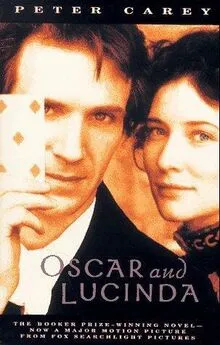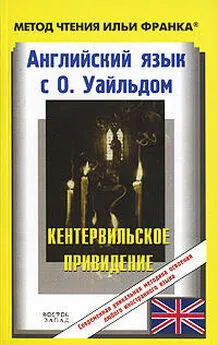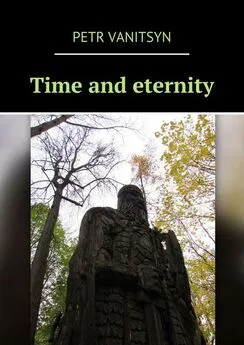Peter Carey - Oscar and Lucinda
- Название:Oscar and Lucinda
- Автор:
- Жанр:
- Издательство:Vintage Books
- Год:1988
- Город:New York
- ISBN:0-679-77750-4
- Рейтинг:
- Избранное:Добавить в избранное
-
Отзывы:
-
Ваша оценка:
Peter Carey - Oscar and Lucinda краткое содержание
The Booker Prize-winning novel-now a major motion picture from Fox Searchlight Pictures.
This sweeping, irrepressibly inventive novel, is a romance, but a romance of the sort that could only take place in nineteenth-century Australia. For only on that sprawling continent-a haven for misfits of both the animal and human kingdoms-could a nervous Anglican minister who gambles on the instructions of the Divine become allied with a teenaged heiress who buys a glassworks to help liberate her sex. And only the prodigious imagination of Peter Carey could implicate Oscar and Lucinda in a narrative of love and commerce, religion and colonialism, that culminates in a half-mad expedition to transport a glass church across the Outback.
Oscar and Lucinda - читать онлайн бесплатно полную версию (весь текст целиком)
Интервал:
Закладка:
In her ear she could hear (but not understand) Mr d'Abbs: "I have let him have this office, you see. A head clerk is everything. It is what it is all built on. You see, you understand. A head clerk is basalt, granite, you see, although it may not have occurred to you before." The words were dead leaves rustling. She felt him plucking at her with fingers like a begging gypsy, sharp little fingers plucking at the crêpe shoulder of her dress, the flouncing on her sleeve. Lucinda did not care for the look of this Mr Jeffris. He had dark and hostile eyes. She had earned his hate just by opening his door. It was too late to retreat and she walked beyond the reach of Mr d'Abbs's plucking invocations and out into the office, between the desks of clerks who, although they were grown men, and some of them quite stern and military in appearance, shuffled their feet and hid amongst their books like schoolchildren. She saw Oscar at last. The light was bright outside the window so he appeared to her in silhouette-the tangled shape of his hair was what marked him out. It was only when she was very close that she could see the expression on his face. He would not deny her. She saw that. He looked up and smiled but it was a pitiable expression. Oh, Lord, she thought, the poor man will have to stand. She swung on her heel. She felt the eyes of all the clerks. She smelt the alleyway, the sour smell of urine. She felt their scorn for her small body, her womanliness, for the sound of her tread on their boards. She nodded to Mr Jeffris, and to Mr d'Abbs who had returned to the open door like a dog forbidden the parlour. When she reached him, she turned.
"Thank you," she said. "I wished to see the conditions." She did not stay to talk to Mr d'Abbs. She felt a fool. She hurried back to her office, thinking how little she knew about how the world of men was organized.
That night she heard the puzzling postscript to her visit. Everything in the office had been thrown out of kilter. Mr Jeffris had stormed into Mr d'Abbs's office. There had been shouting. The clerks had stayed
3t their desks, not looking at each other.
irn
77
Happiness
She did not expect to be happy whilst parcelled up in a grubby apron, clogs on her feet, scrubbing her own floors, or being snubbed at the greengrocer's, kept out of her own works, denied the company of Dennis Hasset, becoming so cut off from life that her only companion was a homeless stray, a defrocked priest with blue-stained hands and a sweat-weary smell. These unpromising circumstances served to distract her attention whilst happiness snuck up on her like a poacher in the night.
She had not known she was happy, but it had been silently remarked on by others, by the glass blowers, by Mr d'Abbs, by Mr Chas Ahearn who had paid her a visit and brought her a gift of bantam eggs. They noticed, because her manner was gentler, because they were spared those ironies and sarcasms which Mr Ahearn, for one, had thought much too pronounced of late. She kissed his cheek and called him "uncle" and the old chap blushed to the lobes of his big fleshy ears.
Yet she had not recognized the moment when her scales had tipped from "down" to "up." She had been too busy to notice, until this morning, the Sunday before Advent. She was walking with her lodger down past her piebald cottage (half of it whitewashed, half red brick). It was an hour or so before early service and the Bal main bells were still silent. Sleek Herefords (the property of the bankrupt estate of Whitefield's Farm) gorged themselves on the new spring pasture. Lucinda wore a long white cotton voile with tiny roses worked into it. She carried her gloves and prayer book in one hand and her bonnet in the other. She walked along the thin cattle track along the spine of the point. There was still dew, not a lot, but she felt it soak into the hem of her dress. She did not mind. Oscar strode through the calf-high grass beside her. Nothing happened. Nothing was
Happiness
said. But she thought-I am happy.
She looked at Oscar. He did not notice her. He was busy looking out for snakes, surveying the harbour-a sea of rough hills poured full of silver glass. H had his head up, his head down, his eyes everywhere at once. He had stuck a tiny blue wildflower into the band of his tall black hat. She thought what a pleasant companion he had turned out to be, and if they were in such disgrace that the barely educated vicar of Balmain should think it best not to "see" them as they filed past him out of church, it was a most superior kind of disgrace. She had judged him too hastily. This was a bad habit. It had caused her trouble before. She had compared him to Dennis Hasset and had pursed her lips when he picked up his tea-cup in a certain way, or placed the pot back on the table a little too heavily. She had felt slighted when he had scurried back into his room and shut the door on her. And yet-how quickly it happened-she had come to be proud of the propriety with which they now shared the house, the sense of measured discipline (a virtue she much admired) that they brought to their conduct so that there was a great closeness, the closeness of intimates, but also a considerable distance, the distance not of strangers, but of neighbours. They occupied a positon well above those Philistines who snubbed and slighted them. God, who saw all things, would not find their conduct unbecoming. They did not gamble or take hazards of any type.
Oscar had no experience of female friendship. At first he was shy with her, stammered, tripped over himself, tried to make himself invisible around her. Only in his unholy dreams did he ever imagine anything even slightly more intimate. And if there had been a maid, this is how it might have stayed. But Mrs Froud had retired due to being in a certain condition, and there was no maid at all. There was a cottage that must be looked after, a fireplace that must be red-leaded, soap to be made, carpets beaten, the brass doorknobs taken to with halves of lemon. Seeing how the young mistress worked-quick, small steps, slap of brush, flick of duster, smack of mop, clatter of bucket, an energy quite in excess of what was promised by her physical size-the lodger took off his shiny jacket, rolled up his sleeves to reveal thin milk-white arms, and worked beside her. Lucinda was embarrassed at first. She did not think it manly.
And yet this is how they became friends, by scrubbing the pitted,
Oscar and Lucinda
checkered tiles of the kitchen floor, working side by side, creeping backwards. They did their jobs inexpertly. They drank tea by the potful and kept the leaves to use in rug-cleaning. And when they had at last finished, usually around midnight, Lucinda would kick off her shoes and let them drop on the damp floor and Oscar would put his feet up on a chair. He would be smudged with red-lead, or W. G. Nixey's black-lead, and have sticky wax on his elbows. She thought him an "old woman," a "kind soul," "odd fellow." Sometimes she looked at him and saw him as if she had never seen him before-a "vision," humming, stirring his tea with the blunt end of his knife, hooting with high laughter, talking Latin which he expected her to understand. He was, in his conversation, so elliptical, so tangential. He made her feel plain, uncultured, inelegant. She did not guess her cast-off shoes were "dainty," the object of his admiration. She saw what she had seen aboard the Leviathan-that he was not a man to be so easily patronized, that he was a passionate man, an enthusiastic man, who would plunge into the jungle of ideas, not fearfully, but impatiently (thwack, slap, wet clothes from the copper), but also a pleasure.
He was very homesick and liked to talk about England. It was a different England from the one which had so disappointed her. It was a dear, green place, and she could not know that the Strattons' house was damp and cold or that the Baptist boys had made him eat a stone. He talked fondly of the Strattons whom he called "my patrons" and did not tell her that Hugh Stratton, having as much success with horse-races as he had had with farming, had used Oscar's system to lose all his capital and was into debt so deep he was now begging money from men he had not known since Oriel.
There was a bright white pack of cards in the cedar sideboard by Oscar's elbow. He saw it there, sitting askew beside a ball of grey wool and a tangled tape measure, saw it frequently, each evening when he reached out for the sherry decanter (engraved with the image of an emu) and poured out the two thimblefuls which was their "nightcap." He said nothing about the cards. He imagined his hostess-so disciplined in her running of the household-untroubled by them. He wisher* he had the strength of character to fling them away, but having made himself ridiculous aboard the Leviathan he dared not.
They did not discuss cards, but what they did not talk about gave
Happiness
their evenings a tense and tingling edge and left them both happy, yes, but wakeful in their beds. Lucinda might sneak from her own house at midnight to place a wager somewhere else, but she dared not touch the pack that lay in her own sideboad. She knew how passionate he had become about his "weakness." She dared not even ask him how it was he had reversed his opinions on the matter. But, oh, how she yearned to discuss it with him, how much she wished to deal a hand on a grey wool blanket. There would be no headaches then, only this sweet consummation of their comradeship.
But she said not a word. And although she might have her "dainty" shoes tossed to the floor, have her bare toes quite visible through her stockings, have a draught of sherry in her hand, in short appear quite radical, she was too timid, she thought, too much a mouse, to reveal her gambler's heart to him. She did not like this mouselike quality. As usual, she found herself too careful, too held in.
Once she said: "I wish I had ten sisters and a big kitchen to
laugh in."
Her lodger frowned and dusted his knees.
She thought: He is as near to a sister as I am likely to get, but he does not understand. She would have had a woman friend so they could brush each other's hair, and just, please God, put aside this great clanking suit of ugly
armour.
She kept her glass dreams from him, even whilst she appeared to talk about them. He was an admiring listener, but she only showed him the opaque skin of her dreams-window glass, the price of transporting it, the difficulties with builders who would not pay their bills inside six months. He imagined this was her business, and of course it was, but all the things she spoke of were a fog across its landscape which was filled with such soaring mountains she would be embarrassed to lay claim to them. Her true ambition, the one she would not confess to him, was to build something Extraordinary and Fine from glass and cast-iron. A Crystal Palace, but not a Crystal Palace. A conservatory, but not a conservatory. Glass laced with steel, spun like a spider web-the idea danced around the periphery of her vision, never long enough to be clear. When she attempted to make a sketch, it became diminished, wooden, inelegant. Sometimes, in her dreams, she felt she had discovered its form, but if she had, it was like an improperly fixed photograph which fades when exposed to daylight. She was wise
•viq
Oscar and Lucinda
Читать дальшеИнтервал:
Закладка:









